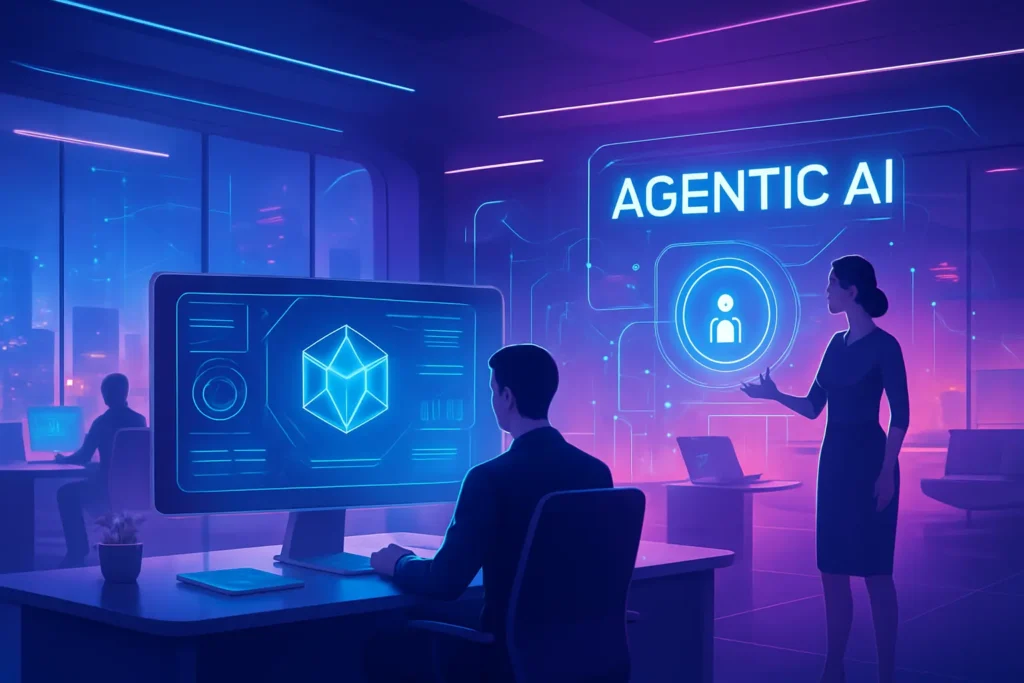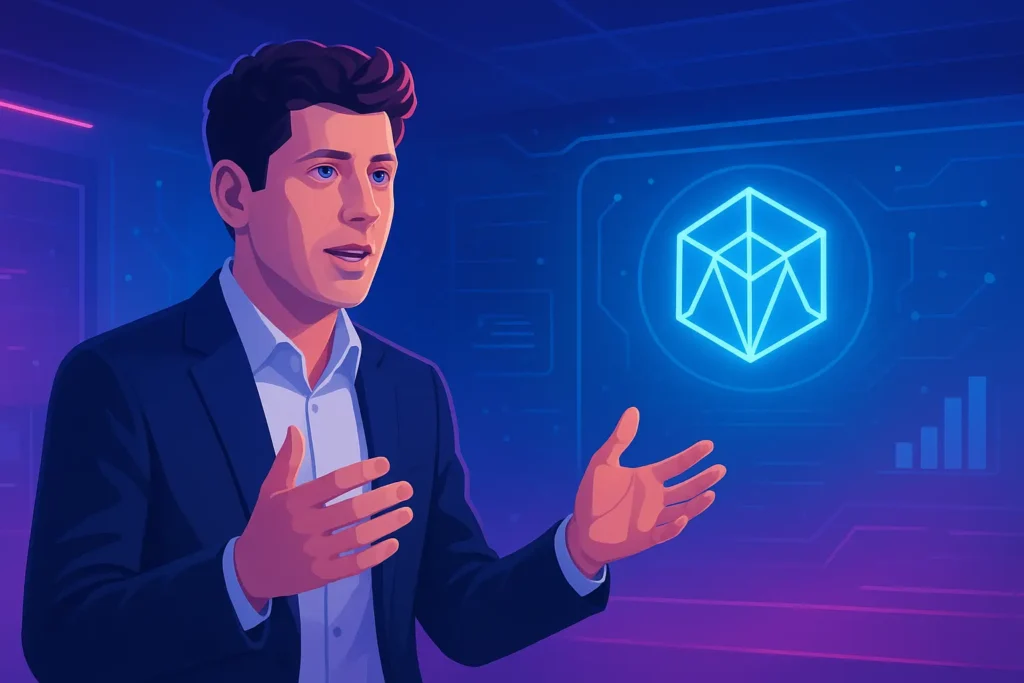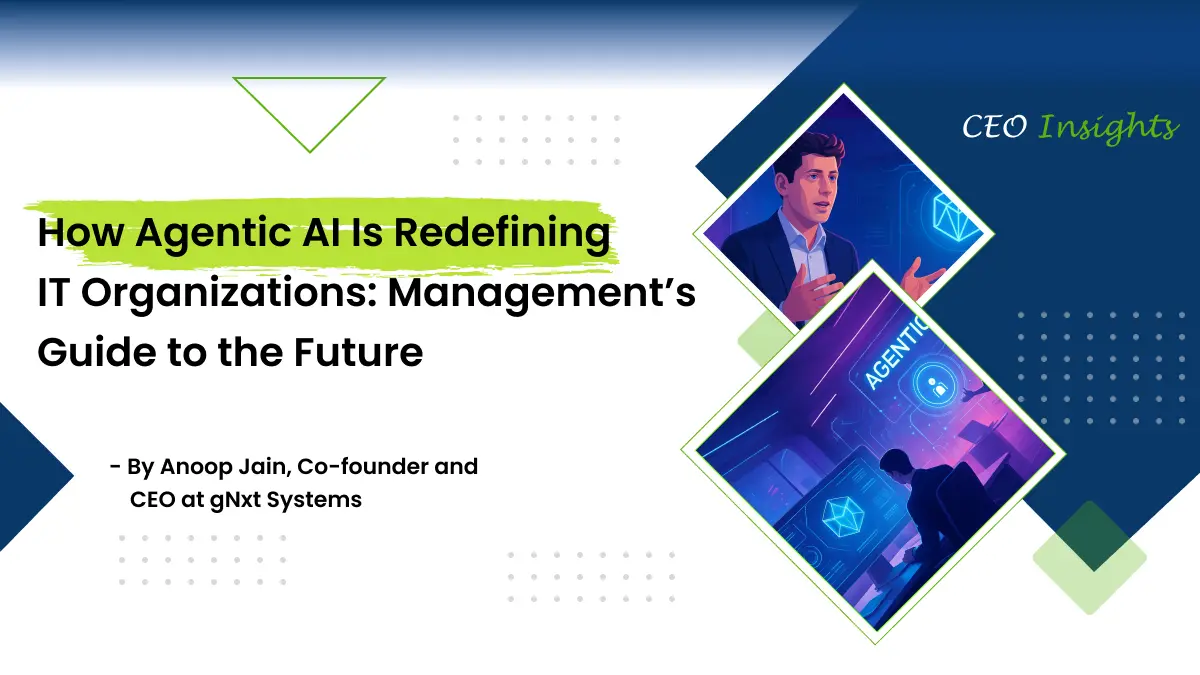- September 9, 2025
- by Anoop Jain
How Agentic AI is Redefining IT Organizations: Management’s Guide to the Future
Introduction: Why Agentic AI Is the Next Inflection Point
Artificial Intelligence has already transformed customer service, analytics, and operations. But a new wave—Agentic AI—is shifting the paradigm. Unlike traditional AI models that analyze and recommend, agentic AI can autonomously plan, adapt, and execute tasks with minimal human input.
For IT leaders, this is not just a technology trend. It is an organizational inflection point as consequential as the rise of DevOps or digital transformation. To thrive, companies must redesign IT organizations into orchestrators of intelligence—balancing innovation speed, governance, and employee trust.
Why Companies Can’t Ignore the Agentic AI Shift

- Adoption is accelerating: Workday research reveals 82% of enterprises are expanding their use of AI agents, even as employees express mixed comfort with AI-driven decision making.
- Companies priorities are shifting: The 2024 State of the CIO survey shows nearly 75% of IT leaders plan to dedicate more time to AI/ML initiatives in the coming year.
- Competitive advantage is at stake: Organizations that embed AI into products, processes, and governance will outperform laggards in efficiency, innovation velocity, and cost optimization.
In short: Agentic AI is no longer optional—it is an operating model decision.
Strategic Pillars: How IT Organizations Must Evolve
1. Product-Centric IT with Embedded Governance
Traditional function-based IT structures cannot keep pace with agent-driven processes. Instead, Companies should pivot to product-based teams, embedding governance and compliance expertise directly into delivery pods.
- Roles like AI Data Quality Specialists ensure model inputs remain clean, unbiased, and auditable.
- AI SREs (Site Reliability Engineers) monitor agent behavior, detect anomalies, and trigger rollbacks when needed.
- FinAI Analysts extend FinOps by tracking AI resource usage, cloud costs, and ROI.
This embedded model accelerates innovation while keeping governance “always on.”
2. Establish AgentOps: The New Operating Discipline
If DevOps revolutionized application delivery, AgentOps will define the AI era. Organizations need playbooks and toolchains for:
- Model registries and provenance tracking to ensure auditability.
- Drift detection to identify when agents deviate from expected behavior.
- Human-in-the-loop guardrails for decisions affecting finances, customers, or employees.
- Automated rollback protocols to minimize risk when agents fail.
AgentOps transforms AI from pilot experiments into enterprise-grade, trusted systems.
3. AI Governance at Machine Speed
Regulatory pressure is rising, from GDPR’s AI provisions to sector-specific compliance in healthcare and finance. Governance cannot be an afterthought. CIOs must implement:
- Real-time audit trails of agent decisions.
- Policy-as-code frameworks that enforce rules automatically.
- Explainability dashboards to satisfy regulators, auditors, and boards.
This ensures compliance and trust while still enabling rapid AI adoption.
4. Change Leadership and Workforce Trust
While executives are eager to expand agent use, employees remain cautious. Workday data shows workers are uneasy about AI acting as a “boss.”
To build adoption:
- Assign Change Champions to guide cultural transition.
- Provide transparent metrics on where AI is applied, how it is monitored, and when humans remain in control.
- Use incremental adoption pilots, allowing teams to opt-in and build confidence before scaling.
Trust is as critical as technology in successful AI transformation.
Measuring Success: KPIs That Matter
Business Outcomes
- Reduction in cycle time for product delivery
- Increase in % of tasks completed autonomously
- Cost savings per agent-driven process
AI Governance Metrics
- Number of incidents requiring rollback per quarter
- Model drift detection and resolution time
- % of AI decisions with auditable logs
Adoption & Trust Metrics
- Employee usage and comfort scores
- Customer NPS on AI-enabled services
- AI-driven content visibility in answer engines
Industry Voices: What Leaders Say About Agentic AI

- OpenAI — “ChatGPT now thinks and acts, proactively choosing from a toolbox of agentic skills to complete tasks for you using its own computer.”
OpenAI’s product announcement frames agents as systems that move beyond conversation to taking multi-step actions on users’ behalf, while noting they require careful safeguards for high-risk tasks. - Sam Altman (OpenAI CEO) — “We believe that, in 2025, we may see the first AI agents ‘join the workforce’ and materially change the output of companies.”
Altman has publicly said agentic systems could become integrated into workplace workflows and change organizational productivity—while stressing iterative safety and human oversight. - Microsoft (Copilot / Autonomous AI guidance) — “Agents are the apps of the AI era, with the copilot as the interface.”
Microsoft describes AI agents as specialized tools that automate business processes and augment productivity—positioning them as composable, enterprise-grade components that integrate with existing systems. - IBM (AI governance perspective) — “AI governance frameworks direct AI research, development and application to help ensure safety, fairness and respect for human rights.”
IBM emphasizes that scaling agentic AI in regulated enterprises requires policy, auditability, and governance controls—arguing governance is central to realizing the value of autonomous systems. - Workday (employee research & adoption) — “75% of employees are ready to work with AI, but not to be managed by it.”
Workday’s research highlights the adoption-ready but cautious workforce—underscoring the importance of transparency, human-in-the-loop designs, and trust when deploying agents.
- gNxt Systems — From our perspective at gNxt Systems, agentic AI is an operating-model inflection that requires product-centric IT, AgentOps, and governance-as-code to make agents trustworthy, auditable, and business-aligned.
“The true power of agentic AI is not in replacing humans, but in orchestrating intelligence across people, processes, and technology. Companies who build this trust-first foundation will define the next decade of enterprise innovation,” says Anoop Jain, CEO of gNxt Systems.
A CIO’s Roadmap: 90-Day Action Plan
Phase 1: Inventory & Guardrails (0–30 days)
- Map all current AI/agent initiatives.
- Establish human approval gates for high-risk processes.
Phase 2: Pilot AgentOps (30–60 days)
- Stand up monitoring dashboards and incident response protocols.
- Embed AI SREs and data-quality specialists in one product team.
Phase 3: Scale with Governance (60–90 days)
- Automate compliance policies with policy-as-code.
- Launch organization-wide AI literacy and change programs.
Conclusion: Orchestrating the Future of Intelligence
Agentic AI is not a side project—it is a strategic redesign of IT itself. Companies who act now will transform IT from a cost center into the nerve center of enterprise intelligence.
At gNxt Systems, we believe the winners of the AI era will not just deploy agents, but build trustworthy, scalable, and adaptive organizations around them. The future is already here—your IT organization must be ready to orchestrate it.
FAQs (Frequently Asked Questions)
Agentic AI refers to autonomous, goal-driven AI agents that plan, adapt, and execute tasks without constant human direction.
Shift to product-based teams, embed governance, define AgentOps playbooks, and create new roles such as AI SREs and FinAI analysts.
Implement governance at machine speed with audit trails, policy-as-code, and automated oversight, while maintaining human-in-the-loop for high-stakes decisions.
Agentic AI introduces specialized roles that go beyond traditional IT functions:
- AI Data Quality Specialists – ensure training data is accurate, unbiased, and auditable.
- AI Reliability Engineers (AI SREs) – monitor agent performance, detect anomalies, and oversee safe rollbacks.
- FinAI Analysts – track AI resource consumption, costs, and ROI.
- Change Leaders – drive adoption, trust, and workforce readiness.
AgentOps is the emerging discipline for managing the lifecycle of agentic AI systems. It provides the frameworks and tools needed to design, monitor, govern, and scale AI agents reliably. Just as DevOps transformed software delivery, AgentOps will define how enterprises operationalize AI—ensuring agents remain safe, efficient, and business-aligned.
Read these blogs by gNxt Systems. They might interest you:
Top 12 AI Agent Frameworks Transforming Enterprise Development in 2025
LangChain vs CrewAI vs AutoGen: Choosing the Right Agentic AI Framework for Your Business
The Future is Agentic: Preparing Enterprises for the Next Wave of AI Evolution
Agentic AI in 2025: The Definitive Guide to Trends, Real-World Impact, and Adoption Data
Also click this link to check out Agentic AI Offerings by gNxt Systems
About Author

CEO at gNxt Systems
with 25+ years of expertise, Mr. Anoop Jain delivers complex projects, driving innovation through IT strategies and inspiring teams to achieve milestones in a competitive, technology-driven landscape.


